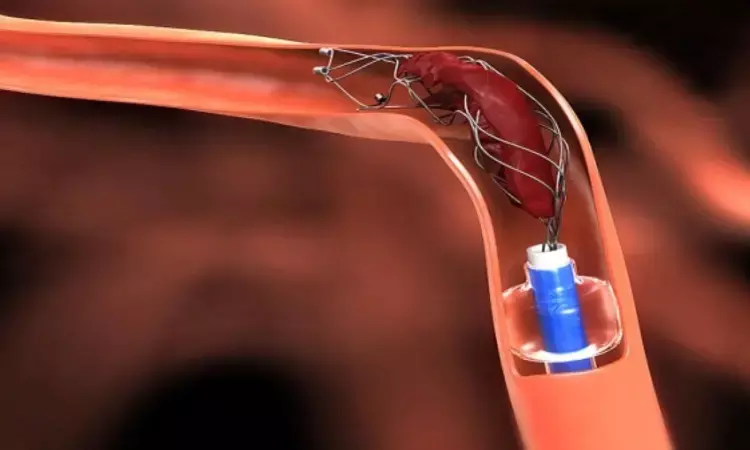- Home
- Medical news & Guidelines
- Anesthesiology
- Cardiology and CTVS
- Critical Care
- Dentistry
- Dermatology
- Diabetes and Endocrinology
- ENT
- Gastroenterology
- Medicine
- Nephrology
- Neurology
- Obstretics-Gynaecology
- Oncology
- Ophthalmology
- Orthopaedics
- Pediatrics-Neonatology
- Psychiatry
- Pulmonology
- Radiology
- Surgery
- Urology
- Laboratory Medicine
- Diet
- Nursing
- Paramedical
- Physiotherapy
- Health news
- Fact Check
- Bone Health Fact Check
- Brain Health Fact Check
- Cancer Related Fact Check
- Child Care Fact Check
- Dental and oral health fact check
- Diabetes and metabolic health fact check
- Diet and Nutrition Fact Check
- Eye and ENT Care Fact Check
- Fitness fact check
- Gut health fact check
- Heart health fact check
- Kidney health fact check
- Medical education fact check
- Men's health fact check
- Respiratory fact check
- Skin and hair care fact check
- Vaccine and Immunization fact check
- Women's health fact check
- AYUSH
- State News
- Andaman and Nicobar Islands
- Andhra Pradesh
- Arunachal Pradesh
- Assam
- Bihar
- Chandigarh
- Chattisgarh
- Dadra and Nagar Haveli
- Daman and Diu
- Delhi
- Goa
- Gujarat
- Haryana
- Himachal Pradesh
- Jammu & Kashmir
- Jharkhand
- Karnataka
- Kerala
- Ladakh
- Lakshadweep
- Madhya Pradesh
- Maharashtra
- Manipur
- Meghalaya
- Mizoram
- Nagaland
- Odisha
- Puducherry
- Punjab
- Rajasthan
- Sikkim
- Tamil Nadu
- Telangana
- Tripura
- Uttar Pradesh
- Uttrakhand
- West Bengal
- Medical Education
- Industry
Moderate-to-severe anemia after mechanical thrombectomy reduces chances of favorable recovery in stroke patients

A recent study published in Frontiers uncovered a concerning association between postoperative anemia and stroke outcomes following mechanical thrombectomy (MT). Mechanical thrombectomy is a procedure used to remove blood clots in stroke patients but this maneuver may inadvertently lead to anemia.
After conducting retrospective study through a registry-based hospital cohort, the patients with acute ischemic stroke who underwent MT were recruited. The patients were categorized into three groups based on their hemoglobin concentrations within 24 hours after the procedure: no anemia, mild anemia, and moderate-to-severe anemia.
Out of the 470 patients studied, 166 fell into the no anemia group, 168 in the mild anemia group and 136 in the moderate-to-severe anemia group. The moderate-to-severe anemia group consisted of older patients who more commonly had congestive heart failure. Also, they required more device passes during the procedure.
This study revealed that a favorable outcome was less frequently achieved in the moderate-to-severe anemia group compared to the no anemia group which was measured by a 3-month modified Rankin Scale score of 0-2. The adjusted odds ratio for a favorable outcome was significantly lower in patients with lower hemoglobin concentrations within 24 hours after MT.
This study found no significant difference in the rate of final extended thrombolysis or intracranial hemorrhage among the three groups despite the older age and increased prevalence of heart failure in the moderate-to-severe anemia group.
This research highlights a previously unknown association between postoperative anemia and stroke outcomes. Moderate-to-severe anemia within 24 hours after MT was independently linked to a reduced likelihood of a favorable recovery. These findings emphasize the importance of monitoring hemoglobin levels post-procedure and exploring interventions to mitigate the impact of anemia on stroke patients.
Reference:
Inui, R., Koge, J., Tanaka, K., Yoshimoto, T., Shiozawa, M., Abe, S., Ishiyama, H., Imamura, H., Nakahara, J., Kataoka, H., Ihara, M., Toyoda, K., & Koga, M. (2023). Detrimental effect of anemia after mechanical thrombectomy on functional outcome in patients with ischemic stroke. In Frontiers in Neurology (Vol. 14). Frontiers Media SA. https://doi.org/10.3389/fneur.2023.1299891
Neuroscience Masters graduate
Jacinthlyn Sylvia, a Neuroscience Master's graduate from Chennai has worked extensively in deciphering the neurobiology of cognition and motor control in aging. She also has spread-out exposure to Neurosurgery from her Bachelor’s. She is currently involved in active Neuro-Oncology research. She is an upcoming neuroscientist with a fiery passion for writing. Her news cover at Medical Dialogues feature recent discoveries and updates from the healthcare and biomedical research fields. She can be reached at editorial@medicaldialogues.in
Dr Kamal Kant Kohli-MBBS, DTCD- a chest specialist with more than 30 years of practice and a flair for writing clinical articles, Dr Kamal Kant Kohli joined Medical Dialogues as a Chief Editor of Medical News. Besides writing articles, as an editor, he proofreads and verifies all the medical content published on Medical Dialogues including those coming from journals, studies,medical conferences,guidelines etc. Email: drkohli@medicaldialogues.in. Contact no. 011-43720751


